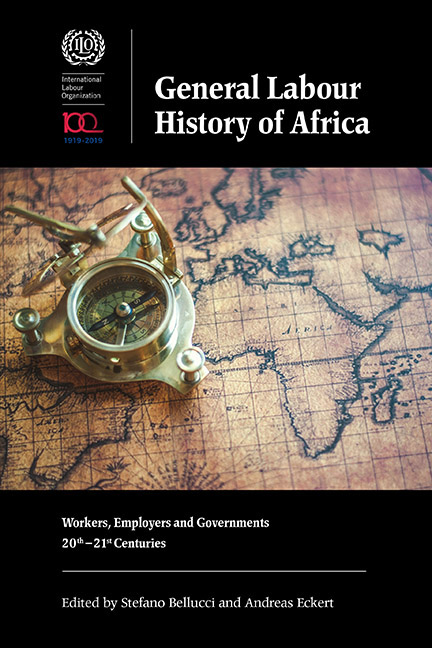Book contents
- Frontmatter
- Contents
- List of Maps and Figures
- List of Tables
- Notes on Contributors
- Foreword
- Acknowledgements
- The ‘Labour Question’ in Africanist Historiography
- Part I Free and Unfree Labour
- 1 Wage Labour
- 2 Precarious and Informal Labour
- 3 Forced Labour
- Part II Key Sectors
- Part III International Dimensions and Mobility
- Part IV Varieties of Work
- Part V Entrepreneurs and Self-Employment
- Part VI The State, Unions and Welfare
- Part VII Conclusions
- Select Bibliography
- Index
2 - Precarious and Informal Labour
from Part I - Free and Unfree Labour
Published online by Cambridge University Press: 21 September 2019
- Frontmatter
- Contents
- List of Maps and Figures
- List of Tables
- Notes on Contributors
- Foreword
- Acknowledgements
- The ‘Labour Question’ in Africanist Historiography
- Part I Free and Unfree Labour
- 1 Wage Labour
- 2 Precarious and Informal Labour
- 3 Forced Labour
- Part II Key Sectors
- Part III International Dimensions and Mobility
- Part IV Varieties of Work
- Part V Entrepreneurs and Self-Employment
- Part VI The State, Unions and Welfare
- Part VII Conclusions
- Select Bibliography
- Index
Summary
The concepts of ‘precarity’ and ‘informality’ have become prominent ways of characterizing the adverse employment impacts of global market liberalization. In sociological terms, the word ‘precariat’ is often used to identify vulnerable populations forced to depend on unprotected and unstable jobs. By referring to both the insecurity of employment conditions and related broader social dislocations and inequalities, ‘precarity’ has tended to mirror the notion of the ‘informal economy’, largely applied to societies in the global South. The International Labour Organization initially used ‘informal’, with a focus on juridical norms, to define undocumented and unregulated activities, largely performed as self-employment. More recently, however, ‘informality’ has come to characterize unprotected occupations in a broader sense, or jobs lacking security and social provisions, even when performed within a legally ‘formal’ sector or in a subordinate relationship towards certified enterprises. In older capitalist countries and emerging economies alike, the expansion of informal employment is crucially shaped by outsourcing and casualization in established companies, which explains the conceptual convergence of informality and precariousness. Such changes decisively question the idea, which played an important role when the notion of the ‘informal sector’ first emerged in the 1970s, that a socio-economic dualism exists between waged and irregular employment.
In the early twenty-first century, precarious and informal work have spurred policy interventions and political strategies by labour and social movements. Collective mobilizations of precarious workers have emphasized that wage labour is failing as a conduit to and guarantor of social integration, citizenship rights, redistributive compacts and subjective stability. Yet the alternative, broadly inspired by a once-triumphant Keynesianism, of a harmonious and equitable wage-based social order has also faded as critics of the welfare state point to its environmentally damaging productivism, gender biases in favour of male breadwinning and narrow national focus of citizenship.
To the extent that they question the idea of wage labour as a standard and universal social norm, the concepts of precarity and informality usefully introduce this chapter's discussion of Africa in the twentieth and early twenty-first centuries, a context in which capitalist production regimes have not led to employment relations typically characterized by stable and protected wage earning.
- Type
- Chapter
- Information
- General Labour History of AfricaWorkers, Employers and Governments, 20th-21st Centuries, pp. 45 - 76Publisher: Boydell & BrewerPrint publication year: 2019



